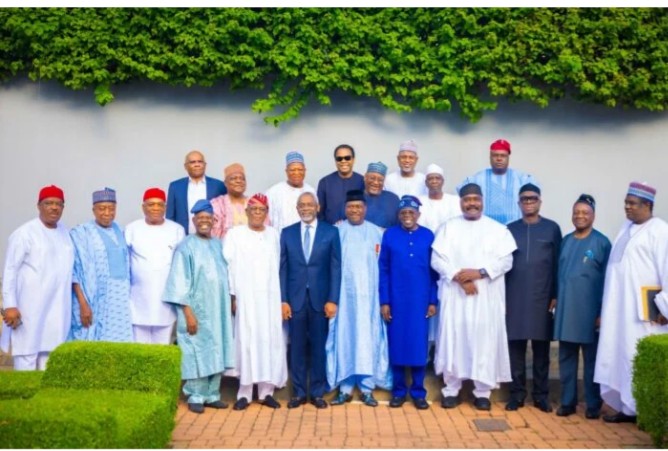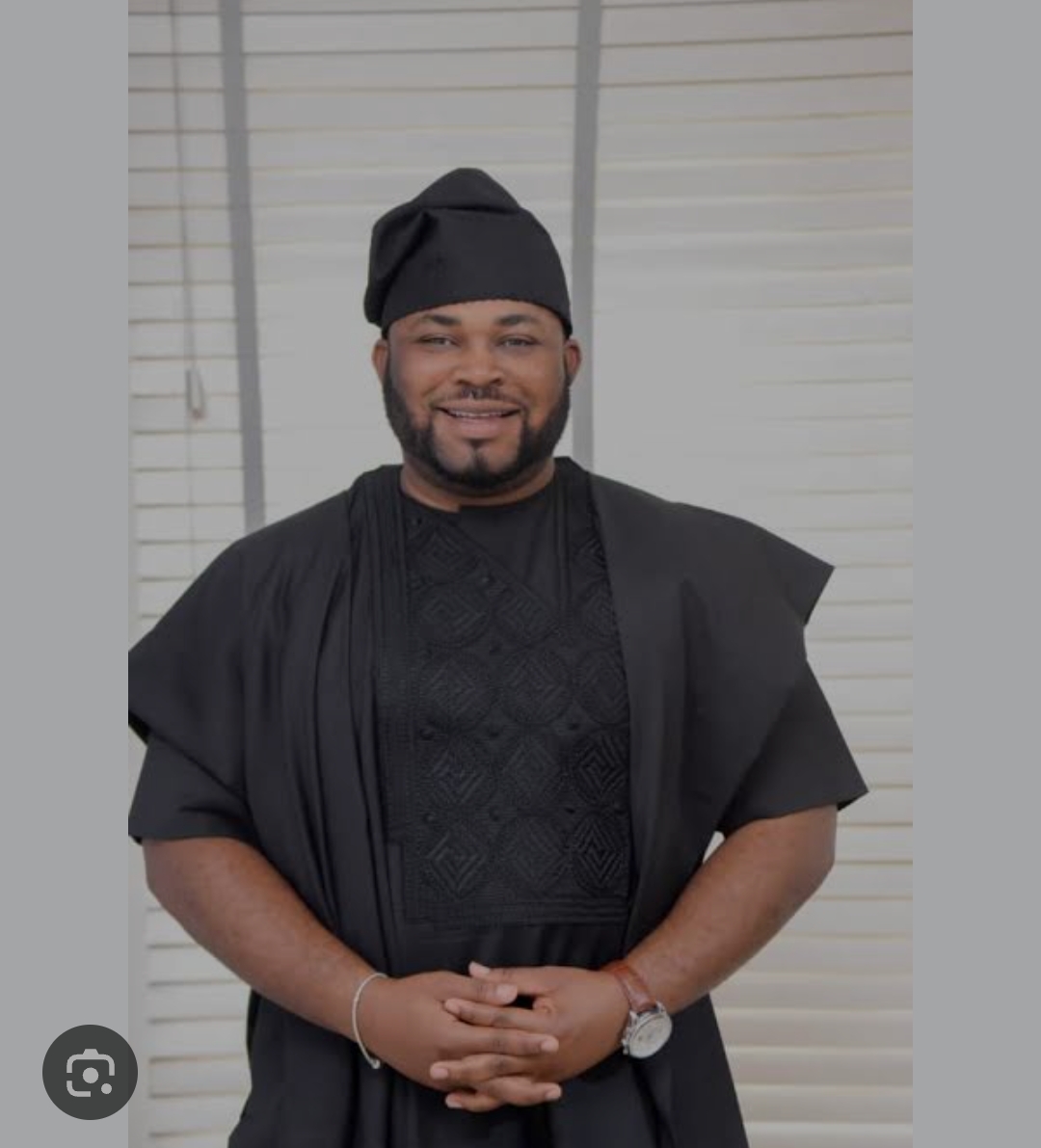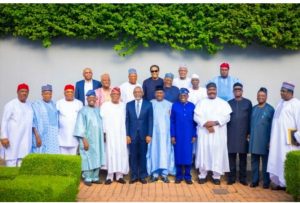celebrity radar - gossips
Where Are The Class Of 1999 Governors Now? 10 Dead, Many Convicted

Where Are The Class Of 1999 Governors Now? 10 Dead, Many Convicted
On Wednesday, President Bola Tinubu hosted some former governors, who were his colleagues, at the council chamber of the presidential villa in Abuja.
The ‘class of 1999’, as they are referred to, were the first elected governors who served after the military era was halted and the fourth republic was welcomed on May 29, 1999. It has been over 20 years since the governors made the historic moment and have all moved into various facets of life.
While one was an ex-president, one is currently the president and another is the secretary to the government of the federation (SGF). Some were senators; some party national chairmen; some battled corruption cases; some have seen the four walls of the prison; while some have died. In fact, some have even retracted from the public glare.
With the recent reunion, this piece takes a quick glance into the lives and journeys of these historic leaders after they left office as governors.
TINUBU: CURRENT PRESIDENT
President Bola Tinubu was the governor of Lagos state from 1999 to 2007 and was once the senator for Lagos West in the Third Republic. During the military era, Tinubu was an activist calling for the return of democracy. He played a significant role in forming the All Progressives Party (APC) and became its national leader in 2014. He supported President Muhammad Buhari’s election in 2015 and in 2023, he won the presidential election.
KALU: SENATOR
In 1999, Orji Kalu was elected the governor of Abia state and four years after, he was re-elected and served till 2007. He was arrested by the Economic Financial Crimes Commission (EFCC) over alleged corruption on July 11, 2007, but released on bail. He lost his senatorial bid to represent Abia North in 2011 and 2015 but later won during the 2019 election.
His senatorial position was partly cut short when he was sentenced to 12 years imprisonment in 2019 but released in 2020 on a re-trial order. He was the immediate past senate chief whip who served from 2019 to June 11, 2023.
HARUNA: STILL POLITICALLY ACTIVE
Boni Haruna was elected governor of Adamawa state in 1999 and re-elected for a second term. He also faced corruption charges in 2008. Haruna lost the 2011 election for Adamawa North senatorial district and was later appointed the minister of youth development for one year in 2015. He is currently a member of the PDP board of trustees and campaigned for Atiku Abubakar in the 2023 election.
ATTAH: NOW A CONSULTANT
Attah, former Akwa Ibom governor. For eight years, Victor Attah governed Akwa Ibom state under the platform of the Peoples Democratic Party (PDP). He was a member of the PDP board of trustees and in 2003, he became the chairman of the governors’ forum.
Attah gave up politics after he lost his presidential nomination in the PDP and ventured into consultancy to assist firms in managing business challenges. The Akwa Ibom airport was named after him by Udoh Emmanuel, the immediate past governor of the state.
NBADINUJU: DEAD
Chinwoke Mbadinuju was governor of Anambra state from 1999 to 2003. Before his political career, he was an associate professor of politics and African studies at the University of New York. He lost his re-election bid to become governor for the second term. On April 11, 2023, Mbadinuju died after a brief illness at the National Hospital, Abuja.
MUAZU: FORMER PDP NATIONAL CHAIRMAN
After serving for four years as Bauchi governor from 1999, Adamu Muazu won his re-election in 2003. In 2015, he was the chairman of the Peoples Democratic Party (PDP) and rallied support for Goodluck Jonathan, who was the presidential candidate of the party. On May 20, 2015, Muazu resigned as chairman of the PDP following the defeat of the party in the 2015 general election.
ALAMIEYESEIGHA: DEAD
Diepreye Alamieyeseigha was governor of Bayelsa state from 1999 to 2005. He was among the class of 1999 governors who faced corruption charges. This led to his impeachment on December 9, 2005.
He was said to have embezzled the sum of $3.2 million in cash and bank account but pleaded guilty before a court in 2007. Former President Goodluck Jonathan pardoned Alamieyeseigha in March 2013. He reportedly died of cardiac arrest at the University of Port Harcourt Teaching Hospital in 2015.
AKUME: NOW SGF
George Akume was a two-term governor of Benue state from 1999 to 2007. He was elected senator representing Benue North-West district from 2007 to 2019, where he later became the minority leader from 2011 to 2015. After he lost his senate re-election bid, Akume was appointed minister of special duties and inter-governmental affairs in the administration of President Muhammadu Buhari from 2019 to 2023. He was recently appointed secretary to the government of the federation by Tinubu.
KACHALLA: DEAD
Mala Kachalla was Borno governor from 1999 to 2003 under the All Nigeria Peoples Party (ANPP). He later joined the Alliance for Democracy (AD), but he lost his re-election bid to Ali Modu Sheriff. He later moved to the PDP. His political journey was cut shut when he died in 2007 at the age of 66 after battling a brief illness at his residence in Maiduguri, the Borno capital.
DUKE: POLITICALLY VIBRANT
Donald Duke, elected governor of Cross River state in 1999 at the age of 38, served for eight years. In 2004, he introduced the famous Calabar Carnival which was known as ‘Africa’s biggest street party’.
Duke was also among the governors who were not under investigation by the EFCC. In 2018, he stated his interest in contesting for the presidential election of 2019. He left the PDP to pursue his ambition under the social democratic party (SDP) platform but later returned to the PDP in 2021.
IBORI: CONVICTED
James Ibori, former governor of Delta state, also served two terms from 1999 to 2007. He also faced corruption charges. Ibori was arrested by the EFCC and arraigned for several charges bordering on abuse of power, theft of public funds, and money laundering among others. His 170 corruption charges were acquitted by a federal high court in Asaba, Delta state, in 2009.
In 2012, the UK Southwark Crown Court sentenced Ibori to 13 years in prison for money laundering. After serving four years, he was released from prison after a court order in 2016. It’s the second time Ibori is meeting Tinubu in the past two months. A picture of Ibori “re-uniting” with Tinubu and Kalu trended on social media in 2017.
EGWU: SENATOR
Sam Egwu served as Ebonyi governor from 1999 to 2007. In 2008, former President Umaru Yar’adua appointed him as minister of education, a position he held till 2010 after the death of Yar’adua. He won the Ebonyi North senatorial position in 2015 and he is currently the state committee chairman on industry.
IGBINEDION: NOT POLITICALLY ACTIVE
Lucky Igbinedion was governor of Edo state from 1999 to 2007 and was elected chairman of the Nigerian governors’ forum during this period. After leaving office, he was declared wanted by the EFCC for alleged 142 counts of financial fraud. Igbinedion was later invited by the EFCC for alleged diversion of public funds in 2021. In May 2023, he celebrated his 66th birthday with family and friends.
ADEBAYO: APC CHIEFTAIN
Adeniyi Adebayo was Ekiti state governor from 1999 to 2003 on the platform of the Alliance for Democracy (AD). He served as the minister of trade in the administration of former president Muhammadu Buhari from 2019 till 2003.
NNAMANI: POLITICALLY VIBRANT
Another 1999 class of governor is Chimaroke Nnamani, a medical doctor turned politician. He was governor from 1999 to 2007. He contested the Enugu East senatorial position, which he held from 2007 to 2011. Nnamani later won the senatorial seat in 2019. During the 2023 senatorial election, the former governor, who contested under the PDP platform, lost his bid to Kelvin Ugwu of the Labour Party (LP).
HASHIDU: DEAD
Abubakar Hashidu is among the 1999 governors who had a dramatic political career. He was the first elected governor of Gombe state and served from 1999 to 2003.
He lost his re-election race in 2003. In 2007, Hashidu was arrested for alleged violence during his political campaign but was freed from court during the trial by his supporters who stormed the court premises. The former governor died after battling an illness on July 27, 2018.
UDENWA: NOT POLITICALLY ACTIVE
Achike Udenwa’s political career started smoothly when he was governor of Imo state from 1999 to 2007 under the PDP. He became the minister of trade and commerce in 2008 until Goodluck Jonathan assumed office as acting president in 2010 and dissolved the cabinet. In 2015, he worked as the coordinator of the PDP presidential campaign organisation in Imo state and was arrested for an alleged campaign fund scandal.
TURAKI: LOST 2023 SENATE BID
Like some of the 1999 governors, Ibrahim Turaki also had a tussle with the EFCC. He was governor from 199 to 2007 and was fortunate to get into the senate when he won the Jigawa north-west senatorial district election in 2007, but he lost his re-election bid in 2011. He was arrested in 2007 over allegations of money laundering and corruption and was letter apprehended in 2017 for “evading court order”.
In October 2022, Turaki was discharged of the corruption charges by a federal high court in Dutse, the Jigawa state capital. In the same year, he won the PDP ticket to contest Jigawa north-west in the 2023 general election which he lost to Husaini Babangida Uba.
MAKARFI: A PDP CHIEFTAIN
Ahmed Makarfi was Kaduna state governor from 1999 to 2007. He was a famous member of the PDP. He won his senatorial race for Kaduna North district after he completed his eight-year tenure as governor. Makarfi was removed as PDP national chairman in 2018 but later reinstated by the supreme court.
He joined the presidential race in 2019 but dropped the ambition after what he described as an “unsatisfactory outcome” of the race. Makarfi was recently appointed by PDP as the chairperson of the electoral committee for the Kogi election.
KWANKWASO: THE STRONG MAN OF KANO POLITICS From 1999 to 2003 and from 2011 to 2015, Rabiu Kwankwaso served as governor of Kano state. He lost his re-election ambition in 2003 but was compensated with the position of the first minister of defence. In 2015, he was elected to the senate and had since chased a presidential position but has been unsuccessful to date.
Ahead of the 2023 election, he founded the New Nigeria Peoples Party (NNPP) and got the presidential ticket but lost the election. Two weeks before his inauguration as president, Tinubu met with Kwankwaso for four hours in Paris, France. Last month, Tinubu received Kwankwaso at the presidential villa.
YAR’ADUA: DEAD
Umaru Yar’Adua won the Katsina governorship election in 1999 and served two terms. He was the first governor to publicly declare his assets. Yar’Adua became Nigeria’s president after winning the 2007 election to succeed former president Olusegun Obasanjo.
The former president travelled out of the country for a medical trip but did not return after several months. The senate then transferred the presidential powers to Goodluck Jonathan, the then vice-president who became acting president. In 2010, Yar’adua, who returned to Nigeria after months of medical treatment in Saudi Arabia, died at the age of 58.
AUDU: DEAD
Abubakar Audu was the first civilian governor of Kogi state in 1992, but the democratic space was disrupted by military rule in 1993. In 1999, he became the governor of the state under the All Nigeria Peoples Party (ANPP). He also had a corruption case with the EFCC in 2003. He won the APC ticket for the Kogi gubernatorial race in 2015 but died as a result of a “bleeding ulcer” on November 22, 2015.
[b]ALIERO: SENATOR[/b]
Adamu Aliero also served as governor from 1999 to 2007. He was a member of the PDP and was a senator for Kebbi Central till December 18, 2008. He is famous for switching from one political party to another. During the Yar’Adua administration, he was named minister of federal capital territory (FCT) but vacated office after the death of Yar’Adua in 2010. He won the Kebbi Central senatorial election in 2023.
KURE: DEAD
Abdulkadir Kure was elected governor of Niger state from 1999 to 2007 under the PDP platform. He was famous for introducing Sharia in the state in 2000 and also revamping the state education system. He died at the age of 60 in Germany on January 8, 2017.
ADESINA: DEAD Lamidi Adesina was Oyo governor from 1999 to 2003. He died in November 2012 at a private hospital in Lagos.
ODILI: NOT POLITICALLY ACTIVE
Peter Odili is another prominent Nigerian politician who was governor of Rivers state from 1999 to 2007. His political career was defined by dramatic events with the EFCC. In 2007, he filed a suit challenging the right of the EFCC to investigate his administration. In 2006, he declared his intention to run in the 2007 election but later stepped down for Yar’Adua.
AKANDE: STILL ACTIVE
Adebisi Akande was Osun governor from 1999 to 2003. He was the first interim chairman of the All Progressive Congress (APC) and Tinubu’s close ally. He marked his 84th birthday in January 2023.
YERIMA: APC CHIEFTAIN
Ahmad Yerima of the then All Progressive Party won the Zamfara governorship race in 1999 and was also re-elected for a second term in 2003. He was the first governor in Nigeria to introduce Sharia law in his state.
After the completion of his second tenure in 2007, he went ahead to contest for the senatorial seat in Zamfara West district, a position he won and held till 2019. In 2022, Yerima got approval from former President Muhammadu Buhari to contest in the 2023 presidential election. However, he was not cleared by his party to contest in the primaries.
BUKAR IBRAHIM: STILL ACTIVE
After serving as Yobe state governor between January 1992 to November 1993 when the military took over, Bukar Ibrahim was elected governor again in 1999, serving two consecutive terms that terminated in 2007. He later became the senator representing Yobe East in the 2007 elections and served in that capacity until 2019.
NYAME: CONVICTED Jolly Nyame’s governorship tenure in Taraba was cut short in November 1993, one year after inauguration, as a result of a military takeover. He, however, came back to contest in 1999 and won the governorship election. He got re-elected in 2003 for a second term which ended in 2007.
Immediately after leaving office, EFCC charged Nyame for fraud to the tune of N1.64 billion. He was convicted in 2018 and eventually sentenced to a 12-year jail term. Before leaving office, former President Muhammadu Buhari granted him a presidential pardon on April 14, 2023, an action widely criticized by civil society organisations and the public.
BAFARAWA: ACTIVE
In 1999, Attahiru Bafarawa became the governor of Sokoto state under the All Nigerian Peoples Party (ANPP). He served for two tenures till 2007. Upon leaving office, Bafarawa contested as president under Democratic Peoples Party (DPP), a party he founded, but lost the election to the late Yar’Adua.
He was among the governors charged for alleged corruption by the EFCC. The charges bordered on illegal sales of government shares,& misappropriation of funds, among others. After a 10-year-long case, he was discharged and acquitted in 2018 by a high court in the state.
DARIYE: CONVICTED
Another 1999 governor that had a dramatic political journey was Joshua Dariye. He contested and won the Plateau state governorship election on the platform of the PDP. He ruled from 1999 to 2003.Dariye was re-elected for another four-year term but was impeached three years later by eight of the twenty-four state assembly members.
In 2007, the state court of appeal ordered that Dariye be reinstated as governor and he completed his tenure in 2007. Dariye won the Plateau Central senatorial seat in 2011 and was re-elected in 2015.
The EFCC, in 2007, charged Dariye with a 23-count charge of money laundering and was finally convicted on June 12, 2018 and was sentenced to 10 years imprisonment. He was, however, released after receiving a presidential pardon by Buhari in April 2023.
ADAMU: APC NATIONAL CHAIRMAN
Abdullahi Adamu won the 1999 Nasarawa governorship election under the platform of PDP, a party he co-founded. He got re-elected in 2003 and completed his two-term tenure in 2007. Subsequently, he became the secretary of the board of trustees (BOT) of the same party.
He further contested and won the Nasarawa West senatorial seat in 2011 and ran for three consecutive terms till April 2022. He was a member of the New PDP that integrated into the APC before the 2015 elections. In March 2022, Adamu became the national chairman of the APC.
MOHAMMED LAWAL: DEAD
Mohammed Lawal was elected as the governor of Kwara state in 1999 under the platform of the All Peoples Party. He held office till 2003 and lost the re-election bid to Bukola Saraki of the PDP. Lawal died after a brief illness in a London hospital in November 2006.
ADEFARATI: DEAD
Adebayo Adefarati was elected governor of Ondo state on the platform of the Alliance for Democracy party (AD). After the completion of his first tenure in 2003, Adefarati lost his re-election bid to Olusegun Agagu, a PDP candidate. In 2007, Adefarati was chosen as AD’s flag bearer in the presidential election but died a few weeks before the poll at the age of 76.
OSOBA: POLITICALLY ACTIVE
Another governor whose tenure was truncated by the 1993 military takeover, but later came back to be elected governor in 1999 was Olusegun Osoba. He first served as governor under the SDP from January 1992 to November 1993. He won the 1999 governorship election under the AD party. He is also Tinubu’s close ally.
The 1999 set of governors was a vibrant one and still remains in close association as seen in the recent reunion with one of theirs who is the new president. In 2006, Tinubu, Boni Haruna, Orji Kalu, Ngige, Yerima and Shekarau objected to the third-term bid of former President Olusegun Obasanjo.
@Cable
celebrity radar - gossips
COAS Ties Battlefield Success to Constitutional Allegiance and Civil Authority

COAS Ties Battlefield Success to Constitutional Allegiance and Civil Authority
During his operational visit to the 4 Special Forces Command in Doma, the Chief of Army Staff, Lieutenant General Waidi Shaibu, delivered a stark message, intertwining the elite unit’s combat effectiveness with an unshakeable pledge of allegiance to President Bola Ahmed Tinubu and the Nigerian Constitution.
While directing troops to intensify high-impact operations, the COAS made it clear that their mission is a direct expression of their constitutional oath. He reaffirmed that the Nigerian Army’s primary role is to defend the nation against external aggression and provide aid to civil authority, all in strict adherence to the supreme law of the land and under the leadership of the Commander-in-Chief.
This emphasis on loyalty served as a powerful backdrop to his operational directives. By linking the “decisive defeat” of terrorists to the Army’s constitutional mandate and loyalty to the President, Lt. Gen. Shaibu sought to galvanise the Special Forces, framing their upcoming engagements not just as military objectives but as a sacred duty to the democratically elected government and the nation’s founding charter. The message was clear: their fight is a fight for the Constitution and the president it empowers.
celebrity radar - gossips
Mercy Johnson Okojie, Purity Okojie Lead Campaign for Girls Tag’s All-in-One Period Care Kit

*Mercy Johnson Okojie, Purity Okojie Lead Campaign for Girls Tag’s All-in-One Period Care Kit
iBlend Services, appointed Regional Agency for Girls Tag alongside its PR and marketing firm, Eddie MPR, has officially launched Girls Tag, described as Nigeria’s first all-in-one period care pack designed for girls aged nine and above.
The initiative seeks to tackle persistent gaps in menstrual health education and access to sanitary products in Nigeria, where many girls experience their first period with little preparation or guidance. According to the promoters, Girls Tag was created to eliminate the fear, confusion, and stigma often associated with puberty, replacing them with confidence, comfort, and dignity.
Beyond hygiene, the brand positions itself as a supportive care system for both girls and parents, offering tools and language to guide families through early puberty conversations.
To strengthen its reach, Girls Tag announced a strategic ambassadorial partnership with Nollywood actress and philanthropist Mercy Johnson Okojie and her daughter, Purity Okojie. The mother-daughter collaboration is intended to reflect authenticity and relatability for Nigerian families navigating similar experiences.
Speaking on the partnership, the leadership of iBlend Services expressed confidence that the ambassadors’ real-life connection would resonate deeply with mothers and daughters nationwide.
Mercy Johnson Okojie, in her remarks, described the initiative as a natural fit, noting that puberty can be an anxious period for both parents and children. She also revealed that her newly authored puberty guide, Youberty, will be included in every Girls Tag kit. The book is designed to help boys and girls aged 10 to 13 better understand the physical and emotional changes that come with growing up.
Each Girls Tag care pack contains premium sanitary pads in various sizes, overnight period pants, panty liners, disposable sanitary bags, a discreet sanitary purse, and a copy of Youberty. The kit is tailored to support first-time and early period experiences while promoting proper hygiene and self-care.
The company disclosed that the product will be available nationwide in Q2 2026 at select retail stores, pharmacies, and malls, with direct delivery options through its website and social media handle, @girlstag.ng.
With its combined focus on education, dignity, and accessibility, Girls Tag aims to reshape menstrual health support for young girls across Nigeria.
celebrity radar - gossips
DSS Invites Ogun LG Chairman, Alebiosu and others Over Attack At APC Stakeholders Meeting

*DSS Invites Ogun LG Chairman, Alebiosu and others Over Attack At APC Stakeholders Meeting*
The Department of State Services (DSS) Abeokuta on Monday invited Ijebu Ode local government Chairman, Hon Dare Alebiosu, and some political thugs alleged to have caused disturbance, incitement and physical attack during an APC stakeholders meeting few days to Ward Congress in the area.
A reliable security source disclosed that an aide of the Governor who was reportedly attacked during the stakeholders meeting was said to have petitioned the DSS.
According to the source, there have been growing concerns over the activities of the LG Chairman, who was alleged to be backing cultists and using them as a tool for harassment and intimidation in the community.
As it was reported, the LG boss was accused to have openly confronted and accused the Governor’s aide for identifying some of the cultists to DSS officials, while one of the cultist was said to have hit their target in the face and removing his medicated glasses. The swift and professional intervention of the Men of DSS quickly deescalated the matter and the meeting went on to a conclusive end.
The meeting which held at the residence of Chief Okuboyejo, the Governor’s Advisory Council Chairman at GRA Ijebu ode became tensed, after the LG chairman invaded the private premises of the old man with a large number of cultists which some of them were allegedly believed to be armed.
The source added that the case is presently with the DSS, while the petitioner has also submitted various evidence against the LG Chairman.
In another turn of event, Commisoner for Urban and regional planning was harassed and robbed, so also the former SLG to the Local govt also almost lost his life as he was attacked with cutlass by thugs who were allegedly said to be led by Dapo Adebajo, he was hospitalized. The case has also been reported to the DSS and Police as at the time of filling this report.
-

 celebrity radar - gossips7 months ago
celebrity radar - gossips7 months agoWhy Babangida’s Hilltop Home Became Nigeria’s Political “Mecca”
-

 society6 months ago
society6 months agoReligion: Africa’s Oldest Weapon of Enslavement and the Forgotten Truth
-

 society7 months ago
society7 months agoPower is a Loan, Not a Possession: The Sacred Duty of Planting People
-

 news3 months ago
news3 months agoWHO REALLY OWNS MONIEPOINT? The $290 Million Deal That Sold Nigeria’s Top Fintech to Foreign Interests









